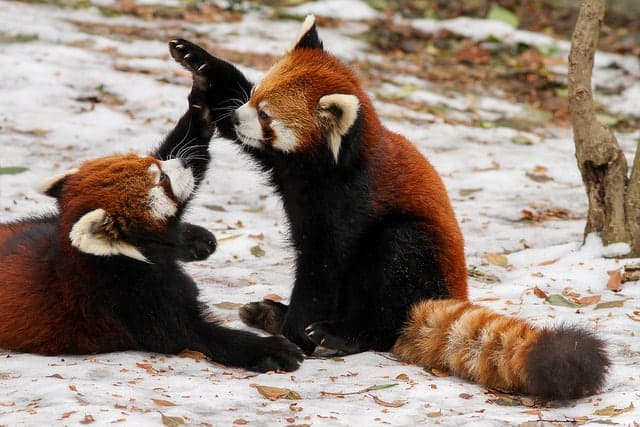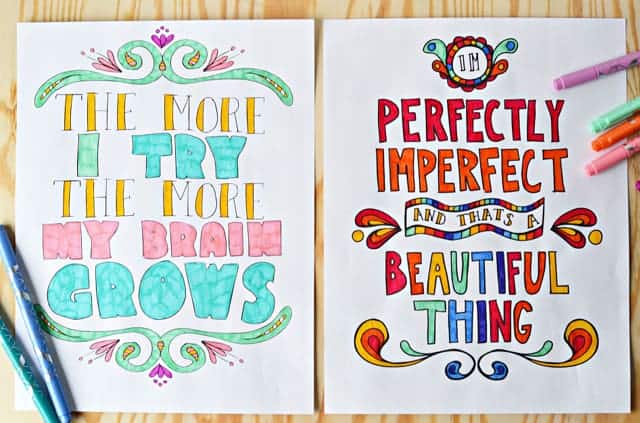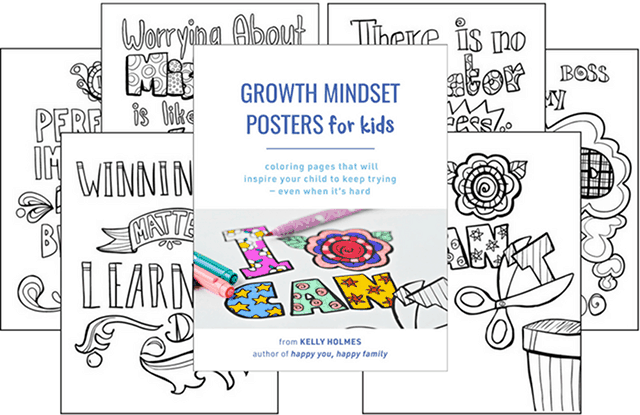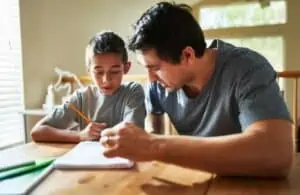The Most Powerful Way to Respond When Your Kid Gives Up
Every Friday when my oldest was in first grade, she’d get a list of spelling words from her teacher: ten main spelling words with five challenge words for extra credit. The next Friday, they’d have a spelling test covering those words.
Because spelling was one of my favorite subjects in grade school, the first time I saw the spelling sheet in her backpack, I couldn’t help but smile. Gold stars, here we come!
So that first week, we practiced every day. In the car, at the dinner table, while she colored with her baby sister.
She rocked the first test, and I figured we had this spelling test business all figured out.
Ready for a shortcut? Get these fun coloring posters for your child to teach them the power of hard work and sticking with a problem.
But Then the Real Test Came
Every week, she got a new list with new words. When we’d first start practicing each list, she didn’t know most—if any—of the words.
But my daughter hates making mistakes. So we couldn’t even get through all the words that first time without her getting frustrated.
Then my big kid would give up.
And seeing her give up left me frustrated.
We’d feed off each other’s negative emotions, and it wasn’t a pretty sight.
Related: Here’s the Secret Phrase to Turn Your Kid Into an Amazing Student {Printable}

Here’s What Worked
One week, I changed my approach. After re-reading this article on why it doesn’t help to tell your kid they’re smart plus all the extra tips I found in my research for that article, I was ready.
I’d just picked her up from school, and we were at a coffee shop, splitting a piece of pumpkin bread.
“How about we practice your spelling words?”
“Okay.” She pointed at the pumpkin bread. “Is this the only snack we’re getting?”
“Yes, silly,” I said. “We can’t fill up on baked goods before dinner.”
She took a huge bite.
“Let’s do something different with spelling words today,” I said. “I know you get frustrated when you make mistakes when you’re first learning the words. Every time you try to spell it but get it wrong, let’s high five.”
She narrowed her eyes. “Why?”
“Because mistakes mean you’re learning. They’re a good thing.”
“Well, what will we do when I get it right?” She took another huge bite of pumpkin bread.
“What do you want to do?” I asked.
She smiled. “Let’s do a double high-five and say ‘wahoo!’”
“Deal.” I held out my hand, and we shook on it. “Do you want to start with the regular words or the challenge words?”

She swallowed her last piece of pumpkin bread. “Challenge words.”
I raised an eyebrow. “Okay. Spell ’November.’”
She grinned. “That’s easy. N-O-V-E-M-B-E-R.”
I put up both hands for a double high-five. We both said “wahoo,” and she giggled and looked around the coffee shop to see if anyone had heard us.
“Can I have more pumpkin bread?” she asked.
I shook my head and smiled. “Again, no,” I said. “Okay, spell ‘motion.’”
She bit her lip. “M-O-…” She paused. “I-O-N?”
“Close! It’s M-O-T-I-O-N.” I put up a hand and smiled big. “High-five, you’re learning!”
She high-fived back but frowned.
“Hey, that’s a good thing. Getting it wrong a few times helps you learn it better.”
“Okay, give me another one.”
“Spell ‘science.’”
“These are hard!” she said.
“That means they’re a good workout for your brain. When we’re done practicing, your brain is going to be even bigger.”
We kept practicing, and every time she got it wrong I put a big smile on my face, held out my hand, and said “High-five, you’re learning!” or “Your brain is bigger now!” or “Next time, it’ll be easier.”
After a few times, she no longer frowned when she got it wrong.
She was actually smiling.
Related: One Powerful Word That Will Stop Negative Self-Talk in Kids {Printable}

The Verdict
When we got through the whole list, I asked, “Well, how did that go? Did it feel better to high-five and celebrate mistakes?”
She grinned and nodded. “Yes.”
“Is there anything else that would have helped more?”
“Every time I get a word wrong, you could give me some more food.”
I laughed.
“What?” she said. “I’m always hungry.”
So I went and bought that girl another piece of pumpkin bread.
She deserved it.
Get Your Copy: 9 Best Mindset Posters That Will Inspire Your Child to Keep Trying
Why You Need to Celebrate Your Child’s Mistakes
If your child tends to give up after they make a mistake or when they’re learning something new, they might be stuck in what researchers call a fixed mindset.
Children who have a fixed mindset believe that you’re as smart as you’ll ever be. They think you can’t change how smart you are, no matter how hard you try. And you can’t change your personality or how creative you are.
But children with a growth mindset believe that if you work hard, you can become smarter. These kids thrive on challenge. And this is important because more than 20 years of research shows that the key to success in school and life is having a growth mindset. In other words, if you believe that trying hard will make you smarter, it will.
If you want to help shift your child’s mindset and inspire them to keep trying, even when it’s hard, one of the best steps you can take is to start celebrating your child’s mistakes. Here’s why:
“Students turn to cheating because they haven’t developed a strategy for handling failure. The problem is compounded when a parent ignores a child’s failures and insists he’ll do better next time. Michigan scholar Jennifer Crocker studies this exact scenario and explains that the child may come to believe failure is something so terrible, the family can’t acknowledge its existence. A child deprived of the opportunity to discuss mistakes can’t learn from them.”
What does it look like to celebrate your child’s mistakes? Here are a few examples:
- Shift your reaction. When your child makes a mistake, pay attention to your reaction, including your facial expression, tone of voice, and the words you say. If it’s not appropriate to use a celebratory tone, try to at least stay neutral. For example, suppose your child is pouring milk into a cereal bowl and misses, spilling milk all over the kitchen counter. My knee-jerk reaction might be to exclaim the child’s name and say something like, “You need to pay more attention to what you’re doing!” But since learning about growth mindset, I’ve practiced adopting a neutral or even upbeat tone in that situation:
- Now, I might say, “Aw, biscuits. The rags are under the sink if you need one.” I keep my tone neutral and my facial expression open to communicate that the mistake isn’t a big deal.
- Or if I’m having a great parenting day and feeling tapped into my playful side, I might act startled and say, “Whoa! Did you see that giant yeti that just barged through here? He walked right over the counter and bumped into the milk jug! Let’s clean it up together.” By making light of the mishap, you send the message that mistakes happen, and they’re not the end of the world.
- Open up at dinner. At the dinner table, go around the table and ask everyone—including adults—to share a mistake from their day and what they learned from it.
- Take a break. If your child is learning something new and getting incredibly frustrated, walk up to them and say, “I can see you’re trying hard. Your brain must be getting a good workout! Let’s go grab an ice cream to celebrate all that hard work.”
But Did That Actually Help Her Learn?
On Friday after her test, I gave her a hug and pulled back to search her face.
“Well?” I asked. “How’d you do on your spelling test?”
She smiled and looked at the ground. “I got a 105.”
“Whoa!”
She giggled.
“So you got all the regular words right, plus all the challenge words right?”
She nodded.
“Wait a second,” I said. I squinted. “How did you do that? Were you just born magically knowing how to spell all those words?”
“No.” Still smiling.
“Tell me your secret. How’d you get a 105?”
She rolled her eyes. “Because I made mistakes and worked hard.”
Duh, Mom.
Print These Coloring Posters to Change Your Kid’s Mindset
I’ve tried countless parenting techniques to encourage a growth mindset in my kids—some of them total duds.
But I wish I’d created these special mindset posters much earlier because the results have been fast and impressive with my grade-schooler and my preschooler. (Even my toddler repeats the growth mindset mantras she hears from her older sisters!)
Thanks to these mindset posters, my kids have internalized powerful, positive mantras to remind them that hard work and sticking with a problem will help their brains grow—and will help them become the people they want to be. (Check out the science behind these growth mindset posters that makes them so powerful with kids.)
Get your own set of mindset posters here, and you’ll unlock your child’s true potential for working hard, not giving up, and learning from her mistakes.
Get your copy now: 9 Best Mindset Posters That Will Inspire Your Child to Keep Trying
Want More?
If you want to nurture a growth mindset in your child, here are our most popular resources:
Your Turn
When your kid gives up, what’s worked well for you? Share in a comment below!








Oh my gosh Kelly, this is brilliant! I love how you were able to turn it around and teach her a valuable lesson. Genius!
I am *so* keeping this one in mind! What a lucky kid to have a mom who knows that there’s value in the trying too!
I loved every word of this! It’s so hard to see kids give up trying and your idea worked brilliantly!
I can not wait to try this with my son. He’s in Kindergarten and tends to get very frustrated and give up quite easily. Thanks so much for sharing.
The found your blog when trying to find resources to help a very competitive, sore loser.
I love this technique, I love that it celebrates learning, and it reinforces that making a mistake means you learn. I can’t wait to agree what we will do for a right answer!
I find your blog very reassuring and inspiring, Thanks
I was the same way as a kid. I love how you’re supporting her – and teaching her mistakes are not only fine, but necessary!
This made me tear up a little! I have a perfectionist 6yr old myself, and I hate seeing him be so hard on himself when he makes mistakes. I’m also a future teacher, so thank you for an awesome idea not only for my kiddo, but for my future students as well! Love it! =D
Brilliant idea! In fact, we addressed the idea of “Embracing Failure” in our September 2016 newsletter. Thank you for offering this useful tip.
I saw this posted on Facebook and had to read it; my daughter is very easily frustrated. This is such great advice. Thank you!
This is my 5 year old as well. I have been doing this after i read an article asking to explain to kids that little lights get switched on when you’re learning a new thing. this visual helped him be kinder to himself/ This is a great add-on to tat!
Brilliant reframe!
Learning to enjoy the process of learning was something that I did not understand until I was out of University and into my first job! I will definitely try this with our daughter! Thank you for the concrete example of what you might say to encourage this. I also love that you asked her what she wants. I’m sure it will surprise us all if we ask our kids that.
Awesome post! Sounds like my kid.. totally need to try this. Thank you so much! So far hugs have helped diffuse the tension but we definitely needed a new game plan and this sounds so right :)
I love this so much <3
My 7 year old daughter gets extremely frustrated if she gets something wrong or can’t do something new on her first try. Any ideas for teaching to tie shoes? I think she is going to be wearing shoes with Velcro forever.
Loved this post! I liked how you were able to turn it around. I’ll def remember this when my son starts school!
Thank you!!!!! Omg I’ve been growing more and more frustrated with being unable to reach my kid no matter how much I try. We’re both fixed mindset but I have developed a way to move past it thanks to my mom even if my knee jerk is to get locked in it. But her tactics simply doesn’t work for me, I cannot manage it but this, THIS seems to be a strategy I can work with!!!
Love this! I will definitely be trying this method on my son. Thank you for the idea!
First of all, I love this – I think it could actually help my daughter (soon to be 7) and it also gave me some insight into my own childhood and feelings about failure. I feel like practicing this approach could make me a better parent (after all, in theory the more parenting mistakes I make…). One thing I can’t stop thinking about though… what school/type of school does your daughter go to that they have spelling tests with words like science and November in 1st grade?! I would like my daughter to go there. :)
Two things that helped my grandson keep trying when learning to read:
1. Telling him that English was a very difficult language to learn because the forms of words were not consistent as in Spanish or Italian
2. Telling him everybody makes mistakes, sharing my own mistakes and laughing about them – we started calling them “mis-snakes.”
Any ideas for scaling this idea up for a 6th grader? Her school never did homework, and now she’s facing *gasp* actual work that needs doing at home. She has always had a short fuse, and despite much effort on our parts to help her over the years, she still gets frustrated super easily. Lately she has taken to assuming she’s “stupid”, that school doesn’t matter, or that our expectations are too high (trust me, they are not). To even get to the point where we can celebrate mistakes, she needs to be willing to sit with the work for more than 5 minutes without arguing that it’s pointless. I’m at my wits’ end.